Kia EV9 vs Mercedes EQS – Performance, range & efficiency compared
Everyday use, family trips or long-distance drives – here’s where the differences show.
Discover whether Kia EV9 or Mercedes EQS fits your lifestyle better.
Costs and Efficiency:
Price and efficiency are often the first things buyers look at. Here it becomes clear which model has the long-term edge – whether at the pump, the plug, or in purchase price.
Kia EV9 has a clearly advantage in terms of price – it starts at 53100 £, while the Mercedes EQS costs 93900 £. That’s a price difference of around 40766 £.
In terms of energy consumption, the advantage goes to the Mercedes EQS: with 16.50 kWh per 100 km, it’s to a small extent more efficient than the Kia EV9 with 19.50 kWh. That’s a difference of about 3 kWh.
As for range, the Mercedes EQS performs evident better – achieving up to 816 km, about 253 km more than the Kia EV9.
Engine and Performance:
Power, torque and acceleration say a lot about how a car feels on the road. This is where you see which model delivers more driving dynamics.
When it comes to engine power, the Mercedes EQS has a minimal edge – offering 544 HP compared to 508 HP. That’s roughly 36 HP more horsepower.
In acceleration from 0 to 100 km/h, the Mercedes EQS is barely noticeable quicker – completing the sprint in 4.40 s, while the Kia EV9 takes 4.60 s. That’s about 0.20 s faster.
In terms of top speed, the Kia EV9 performs hardly perceptible better – reaching 220 km/h, while the Mercedes EQS tops out at 210 km/h. The difference is around 10 km/h.
There’s also a difference in torque: Mercedes EQS pulls somewhat stronger with 858 Nm compared to 740 Nm. That’s about 118 Nm difference.
Space and Everyday Use:
Cabin size, boot volume and payload all play a role in everyday practicality. Here, comfort and flexibility make the difference.
Seats: Kia EV9 offers evident more seating capacity – 7 vs 5.
In curb weight, Kia EV9 is barely noticeable lighter – 2392 kg compared to 2545 kg. The difference is around 153 kg.
In terms of boot space, the Mercedes EQS offers convincingly more room – 610 L compared to 333 L. That’s a difference of about 277 L.
In maximum load capacity, the Kia EV9 performs noticeable better – up to 2393 L, which is about 623 L more than the Mercedes EQS.
When it comes to payload, Kia EV9 slight takes the win – 615 kg compared to 565 kg. That’s a difference of about 50 kg.
Who wins the race?
The Kia EV9 proves to be won narrowly and therefore becomes our DriveDuel Champion!
Kia EV9 is the better all-rounder in this comparison.
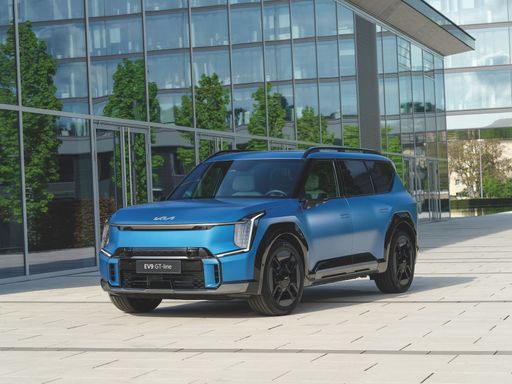
Kia EV9
Kia EV9
The Kia EV9 represents a bold step forward in the automotive world with its distinctive design and futuristic appeal. This all-electric SUV promises to provide a spacious and comfortable cabin experience, making it ideal for families and long journeys. With its emphasis on sustainability and advanced technology, the EV9 aims to redefine the standards for electric vehicles in its category.
details @ press.kia.com
@ press.kia.com
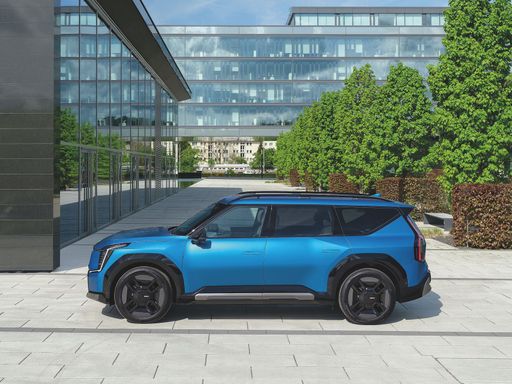 @ press.kia.com
@ press.kia.com
 @ press.kia.com
@ press.kia.com
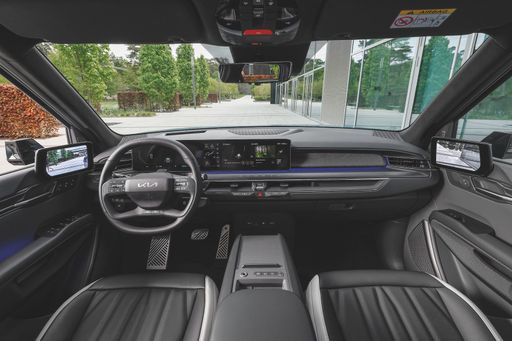 @ press.kia.com
@ press.kia.com
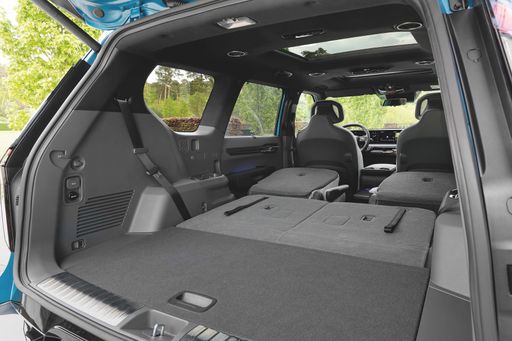 @ press.kia.com
@ press.kia.com
Mercedes EQS
The Mercedes-Benz EQS redefines luxury in the realm of electric vehicles, combining exceptional comfort with cutting-edge technology. Its sleek and aerodynamic design is a testament to both elegance and efficiency, setting new standards for the brand. Inside, the EQS offers a serene and spacious cabin equipped with the latest advancements, ensuring a refined driving experience.
details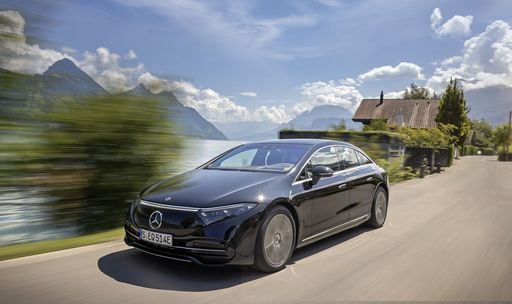 @ group-media.mercedes-benz.com
@ group-media.mercedes-benz.com
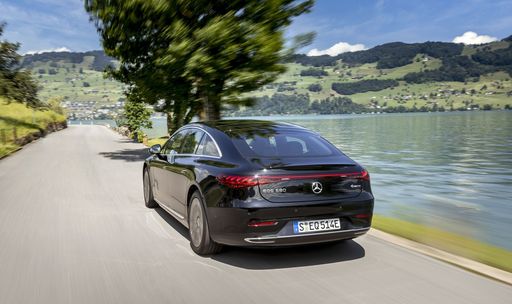 @ group-media.mercedes-benz.com
@ group-media.mercedes-benz.com
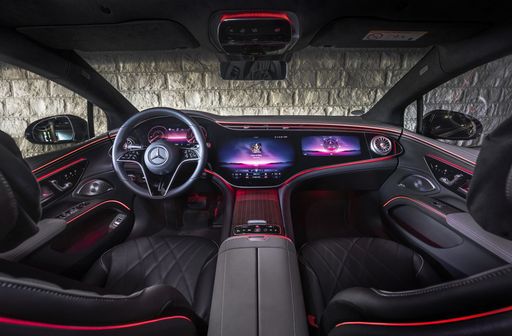 @ group-media.mercedes-benz.com
@ group-media.mercedes-benz.com
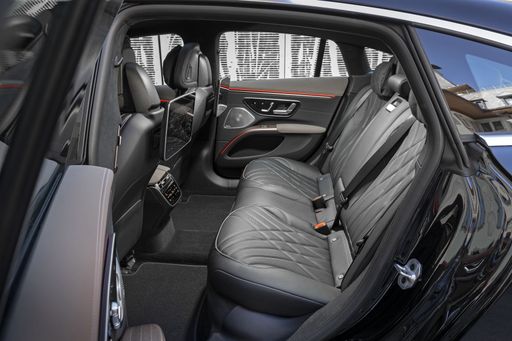 @ group-media.mercedes-benz.com
@ group-media.mercedes-benz.com
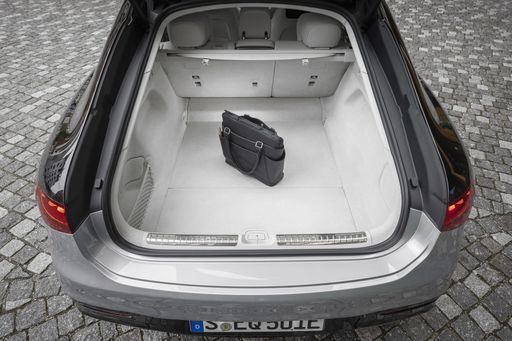 @ group-media.mercedes-benz.com
@ group-media.mercedes-benz.com

|

|
|
|
|
Costs and Consumption |
|
|---|---|
|
Price
53100 - 78000 £
|
Price
93900 - 123500 £
|
|
Consumption L/100km
-
|
Consumption L/100km
-
|
|
Consumption kWh/100km
19.5 - 22.8 kWh
|
Consumption kWh/100km
16.5 - 17.2 kWh
|
|
Electric Range
443 - 563 km
|
Electric Range
790 - 816 km
|
|
Battery Capacity
76.1 - 99.8 kWh
|
Battery Capacity
118 kWh
|
|
co2
0 g/km
|
co2
0 g/km
|
|
Fuel tank capacity
-
|
Fuel tank capacity
-
|
Dimensions and Body |
|
|---|---|
|
Body Type
SUV
|
Body Type
Hatchback
|
|
Seats
6 - 7
|
Seats
5
|
|
Doors
5
|
Doors
5
|
|
Curb weight
2392 - 2664 kg
|
Curb weight
2545 - 2655 kg
|
|
Trunk capacity
333 L
|
Trunk capacity
610 L
|
|
Length
5010 - 5015 mm
|
Length
5223 mm
|
|
Width
1980 mm
|
Width
1926 mm
|
|
Height
1755 - 1780 mm
|
Height
1512 mm
|
|
Max trunk capacity
2318 - 2393 L
|
Max trunk capacity
1770 L
|
|
Payload
542 - 615 kg
|
Payload
550 - 565 kg
|
Engine and Performance |
|
|---|---|
|
Engine Type
Electric
|
Engine Type
Electric
|
|
Transmission
Automatic
|
Transmission
Automatic
|
|
Transmission Detail
Reduction Gearbox
|
Transmission Detail
Reduction Gearbox
|
|
Drive Type
All-Wheel Drive, Rear-Wheel Drive
|
Drive Type
All-Wheel Drive, Rear-Wheel Drive
|
|
Power HP
204 - 508 HP
|
Power HP
360 - 544 HP
|
|
Acceleration 0-100km/h
4.6 - 9.4 s
|
Acceleration 0-100km/h
4.4 - 6.2 s
|
|
Max Speed
185 - 220 km/h
|
Max Speed
210 km/h
|
|
Torque
350 - 740 Nm
|
Torque
568 - 858 Nm
|
|
Number of Cylinders
-
|
Number of Cylinders
-
|
|
Power kW
150 - 374 kW
|
Power kW
265 - 400 kW
|
|
Engine capacity
-
|
Engine capacity
-
|
General |
|
|---|---|
|
Model Year
2023 - 2025
|
Model Year
2024
|
|
CO2 Efficiency Class
A
|
CO2 Efficiency Class
A
|
|
Brand
Kia
|
Brand
Mercedes-Benz
|
Is the Kia EV9 offered with different drivetrains?
The Kia EV9 is offered with All-Wheel Drive or Rear-Wheel Drive.
The prices and data displayed are estimates based on German list prices and may vary by country. This information is not legally binding.
